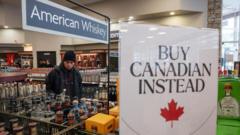The threat of new tariffs from President Trump has catalyzed a wave of anti-American sentiment in Canada, leading many to reconsider their relationships with American businesses and prioritize local consumption. Polls indicate a significant shift in public opinion towards less reliance on the US, reflecting a unity in patriotism across various political divides.
Canadian Sentiment Shifts Amid US Tariff Threats

Canadian Sentiment Shifts Amid US Tariff Threats
As tensions rise between the US and Canada over proposed tariffs, many Canadians express deep-seated anger and a desire for greater national independence.
In light of the escalating tensions between the United States and Canada over potential tariffs, many Canadians are expressing profound changes in their attitudes toward the US, leading some to declare a desire for a more independent national identity. Monika Morelli, a Montreal resident, epitomizes this sentiment. After President Trump threatened heavy tariffs on Canadian imports, she decided to cancel subscriptions to major American companies such as Netflix and Amazon and withdrawn from planned travel to the US. "There is something that has been irrevocably broken now," she stated, reflecting the deep emotional repercussions of the tariff threat.
Trump's announcement of a 25% tariff on imports from Canada and Mexico was primarily justified on national security grounds. Following a surprising agreement with Mexico, the tariffs' implementation was delayed for 30 days, sparking mixed reactions among the Canadian populace. Although many sighed in relief at the temporary hiatus, numerous individuals believe the damage to the US-Canada relationship may be irreparable.
Recent polling data from Angus Reid indicates a seismic shift in Canadian sentiment; a staggering 91% of Canadians would prefer to reduce reliance on the US economy, even if that means risking investment opportunities. Shachi Kurl, president of Angus Reid, noted that the resulting surge in national pride signifies a distinct "moment of unity," a reaction to the perceived threat from the US.
The financial implications of the tariffs loom over the Canadian economy, with fears that worsening trade relations could spark a recession and jeopardize thousands of jobs. Concurrent with Trump's insistence that Canada might become the next US state, many Canadians have reacted by rallying against perceived threats to their sovereignty. Traditional displays of patriotism have surged as calls for a "Buy Canadian" movement gain traction, with numerous citizens choosing to boycott American products and support local businesses.
In response, provincial governments are initiating "Buy Local" campaigns. For instance, Manitoba's Premier Wab Kinew announced a C$140,000 advertising campaign aimed at fostering local economic support. Kinew characterized the ongoing trade negotiations as a type of "whiplash," yet praised the resultant unity and resilience witnessed among Canadians.
Kurl emphasized the intertwined historical relationship between the two nations, highlighting economic interdependence and familial ties across the long shared border. The extent to which these tariffs and their associated sentiments represent a fundamental shift in the US-Canada relationship remains uncertain.
As Canadians navigate these turbulent waters, there is an apparent desire to focus on fostering a sense of national pride as they wait to see how the situation unfolds. "We don't put on big displays like Americans do," noted Carole Chandler, a retired educator from Halifax, "but Canadian patriotism runs deep." The future of economic ties and national allegiance is now a focal point for Canadians as they face these significant challenges.





















